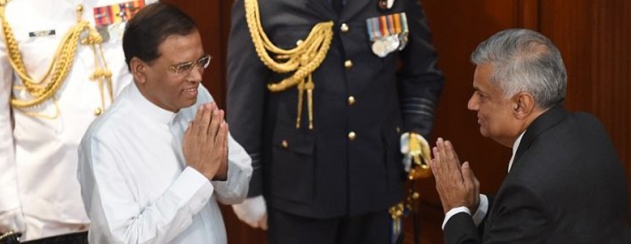(Prime Minister Ranil Wickremesinghe being greeted by President Maithripala Sirisena during the former’s swearing-in ceremony.)
-By Jayatilleke de Silva.
Journalists, especially political columnists whose vocation is writing contemporary history or recording action and events as they happen live have, nevertheless, a customary habit of looking back at the year that just receded on every New Year’s Day. True to tradition we would also like to take a retrospective glance at the Year 2015.
It does need the acumen of a political scientist or the experience of a seasoned politician to name the momentous event in Sri Lanka that happened last year. By all standards it was the Presidential election of January 8 which not only changed the steward of the ship of state but also replaced the authoritarian rule designed to perpetuate an archaic family rule with a democratic government whose motto is Yaha Palanaya or Good Governance.
This was followed by the Parliamentary election of August 2015 that again confirmed the people’s verdict of January 8th. Taken together these two events laid the foundation for a real change the way the country is governed. All significant developments in the course of the year had as its source either of these two events or both taken together. They were either their consequences or responses to them.
The first of these consequences was the development of a broader national consensus toward national reconciliation and unity. It also marked a visible retreat of chauvinist forces and fundamentalist groups that had the patronage of the state earlier.
Freedom of expression
This was accompanied by the elimination of fear among the population – fear of the neighbour, fear of the State, fear of intimidation and death etc. Citizens breathed free from Pt Pedro to Pt Dondra and the ubiquitous and notorious ‘White Van’ disappeared from the streets.
President Maithripala Sirisena takes the oath of office at Independence Square in Colombo on January 9.
Media also breathed free. News reporting became more balanced and the hegemony of the ruling party in the media began to wither away. Freedom of expression found more space and as a result even the Head of State was not spared by the critics today.
Another significant development was the success of the Government in salvaging the prestige of the country in the world by timely corrective measures which broke the island’s isolation from the international community caused by the folly of the previous regime.
For the first time in post-independence history civil society came to the fore, even dictating terms to the politicians on the way forward. This empowerment of the civil society is a sign of maturing democracy. Further, it is here to stay.
Even the minority Government in the period between the two elections has to its credit the passage of the 19th Amendment to the Constitution, albeit in a truncated form. The last named deformity being caused by the virulent opposition of the loyalists of the former regime who outnumbered those representing the government in the legislature.
This is not to conclude that everything was rosy and everything went on as scheduled. Nay, the reality is far from it.
One serious drawback is that the Parliament and the Cabinet of Ministers in the present Government does not truly reflect the people’s verdict as both representations and portfolios were distribute in a manner that does not correspond to the voter’ intentions.
Moreover, old practices continue unabated even in the ranks of the government and in the administration. There are also structural weaknesses in administrative and other fields which prevent the carrying out of the government’s programmes. Financial constraints, lack of human and material resources etc. all bring the machinery of State to a grinding halt or cause hiccups slowing down the passage of reforms.
Strategy of economic development
To make matters worse macro-economic climate has deteriorated. Worst still is the lack of coherence and clarity in the strategy of economic development about which there is hardly any dialogue even among economists.
One year has passed. The much talked about formulation of national policies has not even started. Even in the cases where legislation is being prepared progress is regrettably slow. As far as investigations into corrupt practices and criminal activities of high profile personalities in the last government public is fast losing hope that any substantial outcome. On the contrary there seems to be collusion to hide them under the carpet.
However, there is no ground to lose hope. Still there are ample opportunities to salvage the reform process. The basic hope lies in the unity of the people and their basic support to the regime despite its shortcomings. People do understand that a return to the old regime should be prevented. There lies the hope for the Government too. It should take the people into confidence.
There is a golden opportunity to draft a new Constitution which could also be used to find a solution to the National Question. We have wasted all previous opportunities. Let us not waste the present opportunity too.
In this respect the government and the people should be vigilant about the threat from reactionary forces who would attempt to sabotage the reform process by using pseudo-nationalist and anti-imperialist slogans while serving the interests of the dark forces of chauvinism and authoritarianism. It is necessary to unmask who these “friends of the people” are and how they fight the forces of change.
CDN
